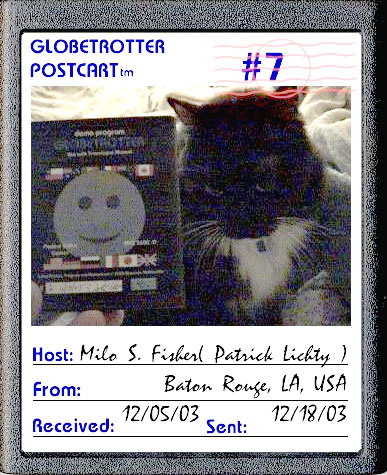
intelligent agent vol. 4 no. 1
dj/vj
globetrotter: patrick lichty talks to weston hilton
download pdf
dj/vj
globetrotter: patrick lichty talks to weston hilton
download pdf
 |
intelligent agent vol. 4 no. 1
dj/vj globetrotter: patrick lichty talks to weston hilton download pdf |
GlobeTrotter:
A Dialogue on DEMOing
Patrick
Lichty talks to Weston Hilton
|
|
What is Globetrotter? It is a demo cartridge for, curiously enough, an Atari 2600; it was created by Weston Hilton and publicized on the Stella Maillist. Stella, which is the code name for the original Atari 2600 prototype, is one of the most lively lists for those interested in programming Atari 2600 consoles. There are individuals who are interested in learning 2600 game design; artists like Paul Slocum who are using the consoles for sound design and performance; and 6502 hackers who are obsessed with the intricacies of 'illegal opcodes' on specific platforms. The world of the 2600 is far from dormant, as is the entire world of retro gaming. Weston
Hilton's Globetrotter was
produced by Packrat Video Games and is a single demo cartridge that also
has a 'passport' that can be signed by those whom Trotter 'visits.'
The appeal of the global nature of DEMO distribution is reflected in Trotter, as Hilton's vision of the project is to see it
make full circuits around the world by sending it to Atari 2600 afficionados
all over the globe. Part DEMO, part conceptual art project (although I
do not imagine that Hilton intended it to be from the beginning), Globetrotter accesses part of the memory of the digital culture
and mixes it with contemporary retro gaming sensibilities. The following
is an excerpt from a conversation I had with Weston Hilton in March, 2004. -Patrick Lichty
PL:
What was your conception of Globetrotter, and how did the project develop?
|
|
Weston
Hilton: I originally envisioned Globetrotter as a complete game to be played on the Atari
2600. When I learned about the PhillyClassic 4 retro gaming convention
through AtariAge.com, and how many people were expected to attend, I
thought this would be a great springboard for getting people to sign
up to help the cart travel from place to place, continent to continent.
I was able to put together just a demo of Globetrotter in time
for the traveling-cart concept to be presented at the show, thanks to
Atariage.com, who were also showing other works-in-progress at their
vending tables. That demo (with a few small changes) is what you see
on the cart today.
I
let the project rest for a while when AtariAge became very busy with
other classic gaming projects after the show, and I thought that interest
in the idea from the gaming community had passed. The idea was given
new life when a similar concept was discussed in the AtariAge forums,
so I talked with Packrat Video Games about helping me sponsor the cart's
journey, and Jarett (Musevox Multimedia) agreed to co-sponsor with me.
PL:
What were your influences in conceiving the
project? Weston
Hilton: My interest
in Atari led me, in early 2003, to search the Net for info on my collection
that had remained dormant for a few years. To my pleasant surprise, the
classic gaming community was still alive and well, and new programs were
being created and shared. I was most impressed by Andrew Davie's work,
which translated the "Dancing Baby" that was made popular on
shows like Ally McBeal into a working demo for the 2600 emulators.
The
positive response to his work and others, plus my youngest brother's plan
to serve an LDS mission in Leeds, England, prompted me to put together
something he could take with him, then mail home to me, thus traveling
a great distance: from England to Utah, USA. The next logical step was
to have the program (in cart form) continue traveling from place to place,
much like other trinkets or letters have been sent from person to person,
creating a connection between people separated by great distances. To
my knowledge, no Atari-related item had been passed along over long distances
in this manner.
So,
the idea's focus morphed from a mass-produced finished project into celebrating
the journey of a unique item logging many miles and hours in circulation,
touring the globe. By not having a specific travel plan, the project has
already begun to take on a life of its own, hopefully creating unity between
those who otherwise may not associate with each other. This also gives
Trotter an interesting story to tell, because of the contributions of
many people.
|
|
| PL:
So far, where has
Globetrotter been (Besides the Intelligent Agent editorial offices?)
Weston
Hilton: Globetrotter officially started his journey on November 15, 2003.
As of this writing (March, 2004), Trotter has had 11 hosts, has stopped in 8 states,
about 15 cities, and been traveling for 3 1/2 months. Some of the stops
included: Los Angeles, Hollywood, Las Vegas, New Orleans, Louisville,
and Boston. It is on his agenda, but Trotter has yet to travel outside
the U.S.
PL: For how long will you send Globetrotter on his travels? Does he have an end point? Weston Hilton: I would like to see Trotter make it at least once completely around the world. This would likely be in a consistently eastward course, crossing the Atlantic Ocean and circling around to enter the continental U.S. again from the Pacific. This is constantly subject to change, depending on who is available to host when Trotter is nearby, and where they live. When Trotter started, the trip was planned to go for 1 year before his return to the start point, here in Orem, Utah. We decided that this should remain flexible, depending on the amount of interest from those who are fans of classic gaming. A year may not be long enough to accommodate everybody who wants to participate. |
 |
PL:
Do you feel Globetrotter was/is successful?
Weston Hilton: The response thus far has been very positive, especially here in the U.S., with a few new hosts signing on to help every week. We have had a smaller response from those outside the States, but expect this involvement to increase once Trotter makes it overseas and others see that Trotter is heading in their direction. We refer to his travels as the "Globetrotter World Tour," because we hope that Trotter will be well received as he tours from one country or state to another. The key is that we want this 'event' to remain flexible in order to allow for small deviations from the overall journey's path around the globe, but organized enough so that the goal of circling the globe is not forgotten. Though not impossible, we don't anticipate Trotter returning to a specific state or country once he's left there. This will help move Trotter along toward his return home. The exception to this is that Globetrotter is traveling post haste to Philadelphia in time for PhillyClassic 5, so he will likely backtrack some of the states he rushed through. PL: Do you consider Globetrotter a conceptual art project, more of a social experiment, or otherwise? Weston
Hilton: As I hinted at in the previous answer,
I would say that Globetrotter fits the
idea of a social experiment. So far, the interaction with hosts has been
positive, and they have enjoyed participating in Trotter's journey. But
I would also venture to say that the 'concept' of the ongoing Globetrotter journey
is more appealing than the DEMO program by itself. In this case, the
DEMO is only one piece of the overall project.
It has also been a lot of fun to see Trotter slowly progress on his journey over time. The URL for the documentation of the journey is http://www.packratvg.com/trotter.htm PL: How do you think Globetrotter fits into the general landscape of computer DEMO programs? Are you a fan of the DEMO genre? If so, who are some of your favorites? (Personally, I was a big fan of Future Crew.) Weston Hilton: I don't have any favorites. The various forms of multimedia out there have always fascinated me. I would be honored if the Globetrotter project is still remembered a few years from now. I haven't really added anything to the advancement of the DEMO scene, but I hope others will be inspired to make their own ideas become a reality. PL: Any further reflections on Globetrotter, and do you plan to do any future projects of this sort? Weston Hilton: I would like to see Globetrotter as a complete game someday. This depends on time, my progress at learning more about programming for the 2600, and my interest level. I have some other game ideas I'd like to develop first. I'm always coming up with a bizarre twist on old ideas, so I won't rule out the possibility of a future contribution to the DEMO scene. :-) For more info, see: www.packratvg.com/trotter |
|